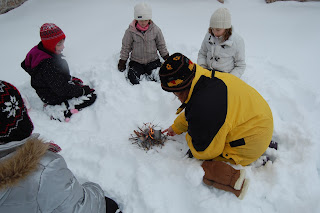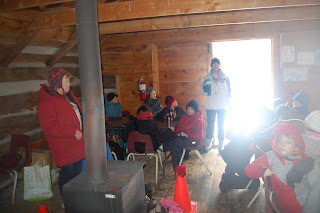Our skilled volunteer leader Alida, who is an interpreter at Murphys Point in the summer and student of all things pertaining to outdoors and education the rest of the time, led us through a great program that featured some helpful tips and fun activities related to winter survival.
The first important message? Don't panic! If you find yourself in a survival situation, stop and think, stay put and make a plan. One way to do this is to pick a landmark, such as a tree, and make it your home base. We practised the skill of finding our landmarks after some disorienting spinning in the field - how quickly could we get to our base?

Another key to survival in the winter is warmth. We know lots of animals have this mastered - they come equipped with special layered fur coats or feathers, for instance. Technically humans have this mastered, too; we just have to use our noggins and dress appropriately. The most important thing is to wear layers: have lots for warmth and peel them off as you cool down and sweat so you don't get cold and clammy. Another trick is to exercise (we did jumping jacks) to keep warm, being careful to conserve your energy.

Speaking of energy, food and water were the next topic. We learned that we can go quite a few days without food, but not long at all without water. We also learned that eating snow takes a lot of energy and uses a lot of warmth, so it's best to build a fire (more warmth) and melt the snow if possible.


We broke into four groups and Alida timed us to see which group could build a small fire (with help from adult volunteers and kit with some supplies) and melt snow in a can the fastest. The winning group completed the task in mere minutes, and one group demonstrated building fires is tricky business - and had no luck at all!



The next big tip for winter survival is to be seen and heard. Like a cardinal against snow, bright colours help a person to be seen. Make noise, too - bring a whistle and emit three short blasts to signal for help. We practised the art of noise making (not that a large group of kids needs a lot of practise with that) by doing coyote calls, with Alida explaining the difference between the noises made by pups and adults.

Our Skipper Pat then "rescued" us with hot chocolate and other snacks in the warm drive shed while we recapped all we'd learned. There was even a little time for frolicking in the snow before going home.


A big thank you to Alida for a great program, as well as to our volunteers Pat, Judy, Beth, Lynn and Steph. Ice fishing fun is planned for the next program - stay tuned!





No comments:
Post a Comment